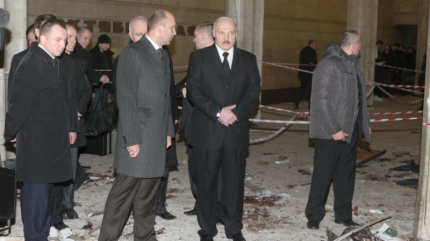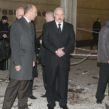
Terrorist Act In Minsk: More Questions Than Answers
Publication: Eurasia Daily Monitor Volume: 8 Issue: 76
By:

On April 11, at around 6:00 pm local time, a bomb exploded at the Kastrichnitskaya (October) Metro Station in central Minsk, killing some commuters instantly, injuring over 200 others, and causing mayhem. It represents the first genuine terrorist act to be reported by the Belarusian authorities, but although five “culprits” have been apprehended, there is no clue as to the motives behind it.
Video cameras studied by the KGB, the Ministry of Internal Affairs, and the Office of the Prosecutor-General reveal a man carrying a bag, alighting from the metro, evidently having traveled from the Frunzenskaya Station, two stations to the north to the only interchange station linking Minsk’s two lines (SB-Belarus Segodnya, April 16). The Kastrichnitskaya Station is located in the heart of Minsk on Independence Avenue, close to Kastrichnitskaya Square and the Palace of the Republic. It is the busiest sector of Minsk and the bomb, placed under a bench, seems to have been timed deliberately to cause maximum damage.
Three days later, Andrei Shved, the Deputy General Public Prosecutor, stated that five people had been arrested and there was “convincing evidence” that the person responsible for making the bomb –which was detonated by remote control– had also made the large bomb that had not exploded at the Independence Day celebration in Minsk (attended by the president) on the night of July 3-4, 2008 (EDM, July 22, 2008).
By April 15, the explosion had resulted in 13 deaths, and 161 people were being treated in Minsk hospitals, with over 20 in critical condition (www.naviny.by, April 15). On this same day, on Belarusian Television, First Deputy Interior Minister Aleh Pyakarski, confirmed that the main suspect was a native of Minsk. He had been detained overnight on April 13, and had to be sobered up before he could provide testimony, which he proceeded to do at 5:00 am (ONT, April 15).
Subsequently, speculation in Minsk has been rife as to the motives of the perpetrators. It has been prompted in part by the striking reaction by the president to the explosion and casualties. Having visited the scene with his six-year old son Kolya, President Alyaksandr Lukashenka declared that the device was the work of “dissidents” and that it was necessary for the authorities to interrogate opposition forces without regard for democratic procedures “and the cries and wailings of foreign sufferers” (Radio Free Europe, April 16). On April 14, Prosecutor-General Ryhor Vasilevich appeared on television to denounce “certain journalists” for reports that he regarded as “dancing on the bones of bombing victims” and issued an official warning to the two extant opposition newspapers, Narodnaya Volya and Nasha Niva (Belorusskiy Partizan, April 15, Narodnaya Volya, April 16).
On virtually every opposition website reporting on the tragedy, the comments section is replete with suggestions that Lukashenka himself was responsible for the attack, seeking a diversion from his current economic problems. While condemning the atrocity, the UN Security Council made reference, cautiously, to “an apparent terrorist attack” (www.telegraf.by, April 14). The president meanwhile made a series of inflammatory comments that, together with some incendiary articles in the official media, give the impression that Belarus is under attack by outside agencies that are using the opposition as a virtual “fifth column.”
Thus, Lukashenka commented that the currency crisis, deficit of foodstuffs, and the Kastrichnitskaya explosion were all linked in “one chain,” the goal of which was to put pressure on the leadership of Belarus (Interfax-Zapad, April 15). On this same day, criminal cases were launched against three former presidential candidates, Andrei Sannikau, Uladzimir Nyaklayeu, and Vital Rymasheuski (www.charter 97.org, April 15), all of which are likely to attract international attention and criticism of the Belarusian authorities. Sannikau has languished in a KGB cell since December 19, 2010. A day after the explosion, Lukashenka hinted he would devalue the currency, despite earlier denials that this would be necessary (Dow Jones Newswires, April 16, EDM, April 12).
On April 16, the main organ of the president, the newspaper SB-Belarus’ Segodnya, contained an English-language insert from the Minsk Times, entitled “Behind the Scenes of One Conspiracy,” and cited some declassified documents on the events of December 19, 2010, indicating that “foreign analytical centers formed and financed” radical structures in Belarus that had attempted to overthrow the legal authorities during the aftermath to the presidential election (SB-Belarus’ Segodnya, April 16). Anatol Lyabedzka, leader of the United Civic Party, who was recently released from prison where he had been held since December 20, likened the attacks in the state media to the anti-Jewish pogroms by Black Hundreds in the late Russian Empire (www.charter97.org, April 14).
Lukashenka has opted to exploit the tragedy to focus public attention on internal “enemies” and to divert attention from a partly self-afflicted economic crisis by alleging an internationally backed conspiracy against his regime. At the same time Russia is not part of this hostile spectrum –the Federal Security Service (FSB) and Russian crime experts are assisting the KGB in the official investigation (RIA Novosti, April 12). But many questions remain. While the president has praised his security services for their prompt actions in uncovering the perpetrators, the lack of security in the metro station on April 11 was shocking.
Five native Belarusians under the age of 30 have been arrested, but are not linked to known terrorist organizations and their motives are unknown. The connection with the 2008 bomb seems pertinent. Arrests were also made at that time, and FSB assistance was requested, but no trial ever materialized (EDM, July 22, 2008). There is no proof that the authorities were involved and it is highly implausible that any opposition faction was implicated. But it is the latter that will be targeted.




